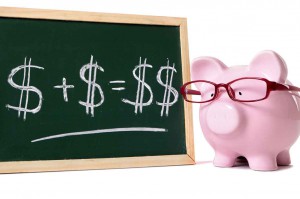Work is crazy, your schedule is crazy, and you feel like you’re going crazy.
You attempt to buy your way to calmness, so you hit up your favorite store or you hit the BUY NOW button online.
Somehow, you feel a sense of satisfaction.
Relief, even.
We’ve all been there.
Impulsive spending is certainly nothing new.
That said, I recently stumbled on some interesting research about the kinds of products we buy when we spend impulsively.
The findings say a lot about how we deal with money in general.
Impulsive Spending Makes Us Feel in Control
In this recent study published in the Journal of Consumer Research, researchers looked at the kind of stuff people buy when they spend impulsively.
You’d think we would buy luxury items, right?
Expensive chocolate, fancy clothes, frivolous gadgets, that sort of thing.
Not exactly.
Somewhat surprisingly, the researchers discovered that impulsive spending leads us to buy practical, useful things. Like Windex.
“Consumers who experience a loss of control are more likely to buy products that are more functional in nature, such as screwdrivers and dish detergent, because these are typically associated with problem-solving, which may enhance people’s sense of control.”
And there it is: the need for control.
It’s so easy to feel a complete lack of control over your own life, including your finances that, sometimes, buying utilitarian products (like cleaning supplies or other household goods) feels productive.
The study hit home for me because Amazon is often the first place I navigate to when I’m feeling burnt out at work. Hitting “buy now” on something you “need” feels like you’re accomplishing something, almost like checking an item off of your to-do list.
And when you’re stressed and confused and vulnerable, that small accomplishment makes you feel better, if only for a moment.
How Impulsive Spending Backfires
This seems harmless, right?
You need stuff, so you buy stuff.
If it makes you feel powerful, what’s wrong with a little utilitarian impulsive spending?
My own Amazon spending is a good place to start in answering that.
This past January, I realized just how out of hand my impulsive spending had become, so I vowed to get a handle on it, but look at how much money I spent on Amazon in 2016, particularly in September (when I happened to be working 50+ hour weeks):
Yes, it’s embarrassing, but there it is. I spent nearly $700 in a single month, and the few months before and after weren’t great, either.
How much Windex does a gal need?
Granted, I was also planning a wedding around that time and a fair portion of that was wedding-related expenses.
However, it was also an expandable garden hose, a steel pet food dish, and–I’m not even making this up–two different kinds of window cleaner.
Little expenses like this add up, and the worst part is that you convince yourself you need them, so you don’t even track them in your budget.
Despite having an actual “splurge fund” to at least limit my impulsive spending, I never even thought to categorize these expenses as “splurges” because they just seemed like basic household necessities.
My point is, we know impulsive spending is a bad habit, but it can also be an insidious one that we don’t even recognize.
Impulsive spending isn’t always expensive, brand-name clothes and shiny new gadgets.
It’s small, seemingly harmless purchases, like household goods we think we need, and that makes it an even more dangerous habit, financially speaking.
Also, buying stuff to feel in control is a harmful illusion.
When you buy your way out of stress, it doesn’t exactly make the stress go away.
It’s still there; you just have some crap on its way to distract you from the problem.
Impulsive spending makes you feel productive and in control, which is also dangerous because it can quickly lead to a lack of control over your budget and your finances.
And that, of course, only makes things worse.
By the time I realized how ridiculous my Amazon spending had become, I had already spent hundreds on non-essentials that I convinced myself were essential.
A Better Way to Feel Powerful
There’s nothing wrong with the desire to feel in control, but buying Windex is a really bizarre way to go about it.
A better solution?
Focus on making meaningful choices.
Making decisions about things, even small decisions, will go a long way toward making you feel more powerful, especially when those choices are tied to something more meaningful than the junk on Amazon.
Author Charles Duhigg talks about this concept in his book, Smarter Faster Better.
In an interview, he explained how people can be taught to feel more powerful:
“You make clear to people how their choices, how their actions have these positive outcomes. Then you put them into situations where they actually have to make controlled choices and in doing so they learn.”
So first, come up with a meaningful goal.
For example, if you feel stressed and powerless at work, it might be a better job.
Then, rather than focus on the things you can’t control, focus on the things you do have control over, then make choices related to your goals in order to feel more control over them.
Those choices could be as simple as:
- Picking a friend to help you update your resume
- Deciding when to talk to your boss about your grievances
- Choosing a new profile picture for your LinkedIn page
Unlike impulsive spending, these choices don’t just provide a short-term illusion of control.
Because they’re related to your goal, they actually do put you in control, as you’re making progress toward something meaningful.
Don’t get me wrong–there’s nothing wrong with the occasional splurge, but don’t trick yourself into thinking spending is an accomplishment.



















